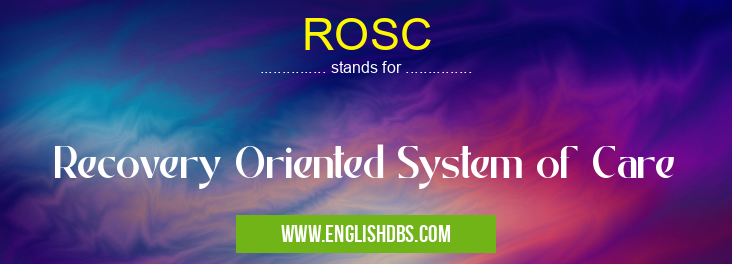What does ROSC mean in UNCLASSIFIED
Recovery Oriented System of Care (ROSC) is a set of strategies, approaches, and services tailored to individuals with mental health problems or substance use disorders that support their recovery, health, and well-being. ROSC is designed to provide an array of comprehensive services that are culturally and linguistically appropriate to individuals' needs. ROSC also provides pathways for response to crises and emergency situations. ROSC has its foundations in the Recovery Movement, which emphasizes self-determination, consumer control over services received, respect for individuals' spirituality and culture, service quality and safety, personal responsibility for building an effective support network in the individual's life space, collaboration between providers and consumers, community integration/accessibility of services/programs to address peer issues/concerns at all levels of care in the system; but more importantly resilience-focused approaches that foster hope and promote healing among people affected by mental illness.

ROSC meaning in Unclassified in Miscellaneous
ROSC mostly used in an acronym Unclassified in Category Miscellaneous that means Recovery Oriented System of Care
Shorthand: ROSC,
Full Form: Recovery Oriented System of Care
For more information of "Recovery Oriented System of Care", see the section below.
Definition
ROSC stands for Recovery Oriented System of Care. It is an integrated system of supports created around the person to increase choice and control through access to a comprehensive range of evidence-based treatments using recovery-oriented principles including self-determination, empowerment through peer supports, access to culturally responsive treatments that build upon strengths rather than deficits. Generally speaking these systems are designed with the goals of improving overall well-being in mind – these can include mental health stability or improved physical health.
Scope
ROSC represents a paradigm shift from traditional treatment models used in mental health systems toward recovery models built on resilience informed practice. This means that instead of relying solely on clinical practices operated from a deficit perspective focused only on eliminating symptoms (distress), Recovery Oriented System of Care seeks to build upon individual’s strengths enabling them to restore functioning lost due to mental illness or substance use disorder. Individualized treatment plans are developed within an Integrated Service Network Model which includes housing support education vocational rehabilitation physical healthcare natural support systems advocacy groups employment programs etc... These plans contain care coordination strategies involving both clinical professionals such as psychiatrists primary care physicians nurses social workers psychologists medical assistants etc… as well as professional peers who have recovered from similar illnesses providing valuable insight into managing ones circumstances.
Essential Questions and Answers on Recovery Oriented System of Care in "MISCELLANEOUS»UNFILED"
What is the Recovery Oriented System of Care (ROSC)?
The Recovery Oriented System of Care (ROSC) is a comprehensive and holistic approach to providing community-based recovery services for individuals with mental health, substance use, and co-occurring disorder needs. It emphasizes building relationships, developing natural supports in the community, and using evidence-based practices.
How does ROSC work?
ROSC uses an individualized model of care that focuses on promoting a person’s strengths and resilience to promote long-term recovery. The model utilizes approaches such as peer support, self-help strategies, goal setting, relapse prevention, skills training, advocacy and more.
Who is eligible for services through ROSC?
Individuals who have a mental health or substance use disorder diagnosis and are seeking recovery can access ROSC services. Eligibility may also depend on factors such as income level or level of risk.
What kind of services are available through ROSC?
Services available through ROSC vary greatly depending on the individual’s needs but may include case management; crisis intervention; medical/psychiatric monitoring; psychosocial rehabilitation; medication management; physical health monitoring; employment support/vocational rehabilitation; housing assistance; care coordination/transitional care planning; substance abuse treatment, therapeutic recreation/hobbies, etc.
How do I access services provided by the Recovery Oriented System of Care?
In order to access services provided by the Recovery Oriented System of Care (ROSC), you must first contact your local mental health or substance abuse agency which will assess your need for services and connect you with the appropriate provider(s).
Do I need to be referred to receive services from ROSC?
Yes - in order to receive services through the Recovery Oriented System of Care (ROSC), you must be referred by your local mental healthcare or substance abuse agency which will assess your need for services and connect you with the appropriate provider(s).
What other supports are offered through ROSC?
Along with direct clinical care delivered within community settings, additional supportive elements such as peer support groups and mutual aid organizations are promoted within an environment that actively engages consumers in their treatment plans and includes family members if desired.
Is there financial assistance available through ROSC?
Yes - many counties provide financial assistance for individuals seeking treatment through the Recovery Oriented System of Care (ROSC) depending upon their need level. Contact your county's social service department for more information.
Are there any risks associated with receiving treatment from ROSC?
As with any type of medical/mental health treatment there may be certain risks associated with receiving treatment from the Recovery Oriented System of Care (ROSC). These risks should always be discussed with a physician before undertaking any type of treatment plan.
Final Words:
In conclusion ROSC provide a holistic programmatic approach that looks beyond symptom reduction alone incorporating strengths based practices into personalized recovery oriented care plans through collaboration among multiple providers utilizing evidence based interventions tailored for each individual's specific needs and desires allowing them greater autonomy while serving as advocate for their full recovery goals going forward.
